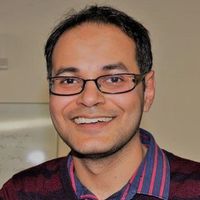Sagnik Dutta's new book explores minority rights in India and charts how Muslim women are challenging legal inequalities.
[Muslim women] construct a just community based upon the ethical ideals of the Quran and rights guaranteed by the Indian Constitution and negotiate for rights within homes, police stations, and neighbourhoods in ghettoes.
Sagnik Dutta
A Gates Cambridge has just published a book which charts a new way of understanding minority rights based on an exploration of the everyday life of Muslim women’s activism in Mumbai.
‘In the Shadow of minority rights’ by Sagnik Dutta [2016] challenges abstract liberal approaches to minority rights and colonial constructions of the minority and shows how women deploy everyday ideas of ethics and bodily practices to challenge inequality in Muslim family law.
Sagnik [pictured below right] says: “They construct a just community based upon the ethical ideals of the Quran and rights guaranteed by the Indian Constitution and negotiate for rights within homes, police stations, and neighbourhoods in ghettoes.”
“Everyday familiarity is interlaced with violence in women’s interactions with the state and non-state actors as they claim their rights, and practices of ethics and intimate negotiations with processes of ghettoisation and violence shape the everyday life of rights.”
 The book was published in mid-September and has already had several reviews including from online magazine Diggit, which called it “an interesting and timely intervention into debates surrounding minority rights, gender and the post-colonial Indian state that have animated the Muslim question in the context of the rise of Hindu nationalism in mainstream politics”.
The book was published in mid-September and has already had several reviews including from online magazine Diggit, which called it “an interesting and timely intervention into debates surrounding minority rights, gender and the post-colonial Indian state that have animated the Muslim question in the context of the rise of Hindu nationalism in mainstream politics”.
The journal Contemporary Political Theory also reviewed it and stated: “Dutta tells a story of Indian democracy that is not just a system of institutional guarantees but an evolving terrain of ethical-political negotiation shaped by plural traditions and contested spaces. Rather than begin with the liberal state as the locus of rights or recognition, Dutta situates political life in the dense, everyday practices of Muslim women who draw simultaneously on Quranic ideals and constitutional commitments. These women do not simply navigate the space between religion and the law; they remake both through ethical labour.”
Background
Sagnik did their PhD on Politics and International Studies and is currently a researcher at the Department of Cultural Studies at Tilburg University in the Netherlands where their research focuses on digitalisation in the Global South and Associate Professor at OP Jindal Global University. Their research explores the everyday life of data colonialism, AI, securitisation and emergent technologies with a regional focus on India. They have published widely in various prominent peer-reviewed journals in the field of gender studies and socio-legal studies such as Feminist Theory, Law and Social Inquiry and Ethnicities.
Sagnik has long been interested in the interaction between minority rights and the law, having spent several years working as a journalist in India covering the Supreme Court and the Muslim women’s reform movement before their PhD.
*Picture credit: Haji Ali Dargah Mosque in Mumbai, India by A. Savin, courtesy of Wikipedia.












